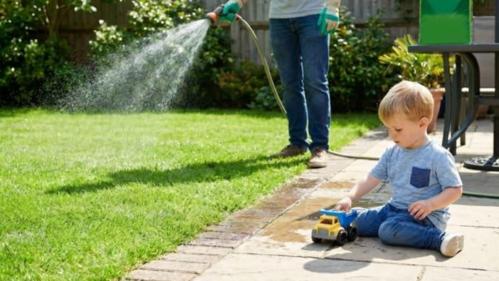Mumps is a viral disease, caused by the paramyxo virus that is most common in unvaccinated children of around 24 months old (although it does also affect older children, teens, and adults).
Although it’s a common childhood disease, it can also be serious, and it’s best to prevent your child from getting mumps by ensuring that they get the MMR vaccine, or to seek treatment quickly if you suspect your child has the disease.
The symptoms of mumps, which are fever, swollen jaw or cheeks, and headache, only appear about two to three weeks after infection, but a person who has been infected with mumps is contagious for about a week before they start to show symptoms, and as long as nine days after.
Infection happens through exposure to infected saliva, so it is usually caught from airborne droplets of saliva from coughing or sneezing. Once the incubation period is over, the symptoms of mumps will last anything from a week to 10 days.
Although most children who have mumps don’t have serious complications from the disease, it can spread and infect other glands in the body. This can lead to sterility in men and boys, if their testicles are infected, and to serious infections of the ovaries and breasts in girls and women.
Mumps is also a potential cause of serious brain infections like meningitis, and encephalitis, and both of these diseases can be fatal if not treated. Since mumps is a viral infection, there is no treatment for the disease, and it will have to run its course. Once infected, children and adults should avoid work or school, to prevent them from passing on the infection, get plenty of rest, and drink lots of fluids.
Another critical factor in preventing your child from getting mumps is to have them vaccinated. After the first MMR vaccination, your child will have 90% immunity to the disease, and when he or she gets the second, booster shot, this increases to 99% immunity. Unless your doctor advises you otherwise, it’s therefore important that you have your child vaccinated, to prevent them from getting mumps.
Although it’s a common childhood disease, it can also be serious, and it’s best to prevent your child from getting mumps by ensuring that they get the MMR vaccine, or to seek treatment quickly if you suspect your child has the disease.
The symptoms of mumps, which are fever, swollen jaw or cheeks, and headache, only appear about two to three weeks after infection, but a person who has been infected with mumps is contagious for about a week before they start to show symptoms, and as long as nine days after.
Infection happens through exposure to infected saliva, so it is usually caught from airborne droplets of saliva from coughing or sneezing. Once the incubation period is over, the symptoms of mumps will last anything from a week to 10 days.
Although most children who have mumps don’t have serious complications from the disease, it can spread and infect other glands in the body. This can lead to sterility in men and boys, if their testicles are infected, and to serious infections of the ovaries and breasts in girls and women.
Mumps is also a potential cause of serious brain infections like meningitis, and encephalitis, and both of these diseases can be fatal if not treated. Since mumps is a viral infection, there is no treatment for the disease, and it will have to run its course. Once infected, children and adults should avoid work or school, to prevent them from passing on the infection, get plenty of rest, and drink lots of fluids.
Another critical factor in preventing your child from getting mumps is to have them vaccinated. After the first MMR vaccination, your child will have 90% immunity to the disease, and when he or she gets the second, booster shot, this increases to 99% immunity. Unless your doctor advises you otherwise, it’s therefore important that you have your child vaccinated, to prevent them from getting mumps.





